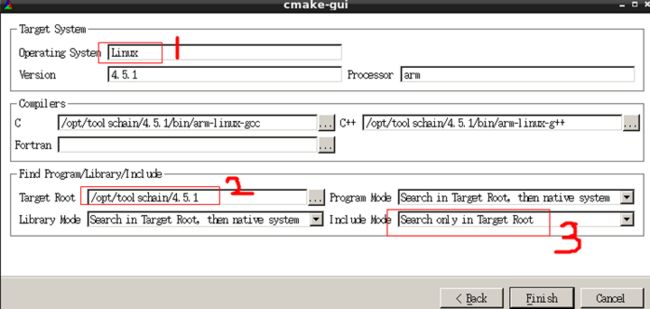linux qt交叉编译opencv,Opencv交叉编译到ARM(基于Qt)
*:前提是Qt交叉编译已经完成,并能正常使用。
1.下载Opencv2.2.0并解压,在解压后的目录下新建一个release目录。
2.安装cmake和cmake-gui。
3.执行命令:cmake-gui
错误提示和解决:
Issue 2. ImportError: No module named sphinx:
Just copy the following line, then this problem disappear.
yum install python-sphinx
Issue 3. ImportError: No module named numpy.distutils
yum install numpy.i686
4.设置源码路径和编译后文件的保存路径。
5.点configure,设置交叉编译工具:
*!:注意:1只能写Linux ,不能写linux或者arm-linux。不然就算编译通过了,在ARM板子上运行会提示:./opencv0:error while loading shared libraries: ../../lib/libopencv_core.so: cannot openshared object file: No such file or directory
2填写交叉编译arm-linux-的安装路径
3.一定要选择:Search in Target Root。否者,编译到59%左右肯定会报错:
/usr/include/bits/mathinline.h:675:3: error: unknown register name ‘st‘ in ‘asm‘
/usr/include/bits/mathinline.h:675:3: error: unknown register name ‘st‘ in ‘asm‘
/usr/include/bits/mathinline.h:675:3: error: unknown register name ‘st‘ in ‘asm‘
6.CMAKE_BUILD_TYPE填Release ;
取消WITH-TH-GTK
取消WITH-TIFF
选择WITH-QT
选择WITH-QTOPENGL
7.再次点configure
8.没有提示错误的话,点Generate,生产Makefile。
9.进到编译后文件的保存路径,修改CMakeCache.txt:
CMAKE_EXE_LINKER_FLAGS:STRING=‘-lpthread-lrt‘
10.执行make
11.错误和解决:
(1),79%报错:
../home/xin/tiaozhansai/OpenCV-2.2.0/modules/ml/src/gbt.cpp:474:error: ‘expl‘ was not declared in this scope
修改gbt.cpp中14行,16行:注释掉
//#if ANDROID
#define expl(x) exp(x)
//#endif
错误消除。
(2)83%
libQtGui.so.4, needed by../../lib/libopencv_highgui.so, not found (try using -rpath or -rpath-link)出现这个错误
是因为交叉编译器没有找到qt库拷贝过去(注意要把所有*.so.4文件拷贝过去)
cp/opt/EmbedSky/qt-4.7-arm/lib/*.so.4/opt/EmbedSky/4.3.3/arm-none-linux-gnueabi/lib/
(4),96%报错:
CMakeFiles/opencv_test.dir/src/highguitest.obj:In function `CV_HighGuiTest::run(int)‘:
highguitest.cpp:(.text._ZN14CV_HighGuiTest3runEi+0x18):warning: the use of `tmpnam‘ is dangerous, better use `mkstemp‘
../../lib/libopencv_features2d.so:undefined reference to `cv::SIFT::SIFT(double, bool, bool, int, int, int, int)‘
解决方法:在OpenCV2.2.0/modules/features2d/src/sift.cpp下
#ifdef __arm__
#define ARM_NO_SIFT
#endif
注释掉#define ARM_NO_SIFT.错误消除,
成功!
#make install
在安装文件夹下生成bin、lib、include三个目录(我的是/usr/local/lib ,
/usr/local/include/opencv ,/usr/local/include/opencv,/usr/local/include/bin)
把lib拷到ARM板对应的目录下(大概有12M左右)。
然后创建:/etc/ld.so.conf
加入:includeld.so.conf.d/*.conf
保存,然后执行:echo"/usr/local/lib" >> /etc/ld.so.conf
再执行:ldconfig
12.测试:新建一个空的Qt工程opencv0
添加一个c++源文件。
修改工程文件:
SOURCES += \
opencv0.cpp
LIBS+= /usr/local/lib/libopencv_calib3d.so\
/usr/local/lib/libopencv_contrib.so \
/usr/local/lib/libopencv_core.so \
/usr/local/lib/libopencv_features2d.so \
/usr/local/lib/libopencv_flann.so \
/usr/local/lib/libopencv_gpu.so \
/usr/local/lib/libopencv_highgui.so \
/usr/local/lib/libopencv_imgproc.so \
/usr/local/lib/libopencv_legacy.so \
/usr/local/lib/libopencv_ml.so \
/usr/local/lib/libopencv_objdetect.so \
/usr/local/lib/libopencv_video.so
INCLUDEPATH+=include/opencv\
include/opencv2\
include
源文件为:
#include"cv.h"
#include"cxcore.h"
#include"highgui.h"
int main(int argc,char*argv[])
{
IplImage *pImg;//声明IplImage指针
pImg=cvLoadImage("/home/SMARTHOME/bin/1.png",1);//载入图片
cvNamedWindow("Image",1);//创建窗口
cvShowImage("Image",pImg);//显示图像
cvWaitKey(0);//等待按键
cvDestroyWindow("Image");//销毁窗口
cvReleaseImage(&pImg);//释放图像
return 0;
}
这里测试的是opencv1的接口。也可以自己写opencv2的,基于Mat类的图像显示。
13.将Ot编译后的elf文件拷到开发板。并执行。
报错:OpenCV Error:Unspecified error (The function is not implemented. Rebuild the library withWindows, GTK+ 2.x or Carbon support. If you are on Ubuntu or Debian, installlibgtk2.0-dev and pkg-config,
then re-run cmake or configure script) incvNamedWindow, file /home/zhw123/software/OpenCV-2.2.0/modules/highgui/src/window.cpp,line 274
terminate called after throwing an instanceof ‘cv::Exception‘
what(): /home/zhw123/software/OpenCV-2.2.0/modules/highgui/src/window.cpp:274:error: (-2) The function is not implemented. Rebuild the library with Windows,GTK+ 2.x or Carbon support. If you are on Ubuntu
or Debian, installlibgtk2.0-dev and pkg-config, then re-run cmake or configure script in functioncvNamedWindow
Aborted
14.因为ARM板子上没有GTK的库,所以不能用highgui的窗口创建等函数。程序改写为使用Qt窗口部件类。
创建一个简单的Qt应用程序,继承自Qwidget。然后改写构造函数:
#include "widget.h"
#include "ui_widget.h"
#include
#include "widget.h"
#include
#include
#include
using namespace cv;
Widget::Widget(QWidget *parent) :
QWidget(parent),
ui(new Ui::Widget)
{
ui->setupUi(this);
Mat srcImage1= imread("/home/SMARTHOME/bin/1.png");//加载图片
Mat rgbImage;
cvtColor(srcImage1,rgbImage,CV_BGR2RGB);//转换颜色空间
QImage img=QImage((const unsigned char *)(rgbImage.data),rgbImage.cols,
rgbImage.rows,rgbImage.cols*rgbImage.channels(),QImage::Format_RGB888);//创建QImage对象
ui->label->setPixmap(QPixmap(QPixmap::fromImage(img)));
ui->label->resize(ui->label->pixmap()->size());
ui->label->move(0,0);
}
Widget::~Widget()
{
delete ui;
}
编译,然后下载到板子,把图片放到elf文件同级目录,执行命令:./opencv0 -qws
版权声明:本文为博主原创文章,未经博主允许不得转载。
原文:http://blog.csdn.net/u013752202/article/details/47358389

